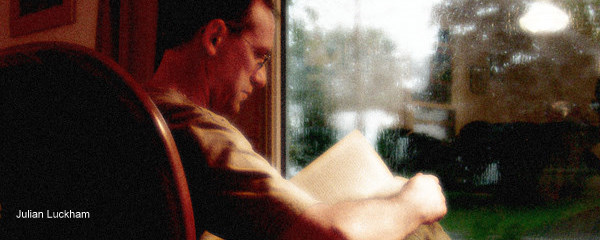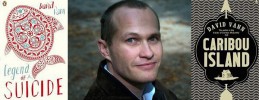
photo by Julian Luckham
by Mike Smith
My acquaintance with Philip K. Dick came through exposure to his short sci-fi stories, and later, of course, through the movie Blade Runner. His work seemed full of chain-smoking men, and women in tight sweaters with artillery-shell breasts. They were drenched with the fear of nuclear holocaust, sexual betrayal, economic failure, and alien invasion; a Cold War, Civil Rights, Women’s Liberation, fear of the future soup of right wing paranoia. I misunderstood the man.
In his story ‘The Eyes have It’ from The Father Thing, volume 3 of the collected stories, Dick lets us know that he understands something about how language works. This short piece is not science fiction, but a comic swipe at the crude use of metaphoric cliché.
In it the protagonist reads a story and interprets the clichéd metaphors within it in a purely literal way. (Literally, in this case means using a word to denote its overt meaning, rather than a metaphoric one… I thought I’d better make that clear, as we so often hear it used these days to mean the opposite – as in ‘it was literally raining cats and dogs’).
Dick’s narrator imagines a monstrous alien that can, quite literally, ‘roll his eyes’ at you. It does a lot more with its eyes too, including roving ‘round the room’, ‘moving from person to person’, and so on. The narrator is horrified. ‘The eyes had clearly come apart from the rest of him’, he notes, and Dick, makes him describe his own situation in a metaphor free way: ‘My heart pounded and my breath choked in my windpipe.’ At the end of the story the narrator finally admits he has ‘no stomach’ to continue reading.
I think the author here is reminding us gently that he can cook, and perhaps making a plea for recognition of his own writing skills, as well as for those of other writers working in the sci-fi genre. I well remember my own outrage when Frank Herbert’s novel Soul Catcher was greeted as a sort of ‘first novel’, despite his award winning multi-volume epic Dune being already well established.
Dick is worth reading for a variety of reasons. As we look back now from the future about which he was speculating, we get not only an interesting view of how the future was perceived then, but also an insight into where, or should I say when, that future was coming from. Over and over again, in reading Dick’s short stories, I get a strong sense of nineteen fifties and nineteen sixties America.
In ‘The Golden Man’, also from volume 3 of the collected stories, the sexual angst is projected into a futuristic imagined world, but seems to me to be entirely contemporary, whenever it is read. In ‘Sales Pitch’, the consumer society is examined. In ‘War Veteran’, racism, genocidal warfare and world domination are touched upon.
Warfare, ongoing or in the recent past, is a common setting of the stories, and the issues of spies, infiltrators, and the enemy within, remind me of early Cold War Macarthyism. The characters in these wrecked and desolate worlds often drive Buicks, smoke Marlboros, and wear suits or slacks and blouses. They are recognisably us, as we were then, but they are also us as we are now, feeling threatened by fears of present conflict and of future apocalypse. The window dressings are period specific, but the human concerns, love, betrayal, success and failure, death and destruction are timeless. Fear of ‘the other’ hiding amongst us crops up again and again.
In fact, as the title of the 2007 collection Human Is? reminds us, Dick, as much as Dickens or Jane Austin, is exploring that huge and still only sketchily mapped territory – What It Is To Be Human.
Nowhere is this more apparent than in Do Androids Dream of Electric Sheep? More deeply than in the film Blade Runner, the novel examines the relationships between real people as well as those between them and the various androids they have created. Rick Deckard has a wife in the novel, and a strong desire to possess the status affirming android animals so popular in his world, if only to placate her! At the end of the book he does not stroll off into the future with an exquisite, but mechanical lover. He goes home to his wife, who in a gesture of reconciliation has bought him an android frog.
What really clarified the difference for me though, was the different presentations of the story, by novelist and film maker, in the Blade Runner boxed collector’s edition dvd specials disc. Here it is made plain in interviews and reminiscences, from film-makers, writers, and friends of Dick, that whereas Ridley Scott saw the Replicants as essentially superior to their human masters, by virtue of their strength, speed, and intelligence, Dick saw them as inferior, because of their lack of compassion, and of love. I’m tempted to believe that this difference marks out not only the gulf between the book and the film, but also that between their two creators and, by extension, between their intended audiences.
Public recognition came late to Dick, and despite the praise heaped upon him as a writer of sci-fi, it was a recognition limited to that given to sci-fi writers, as being of a lesser genre. Herbert, Vonnegut, and Bradbury – and others too, no doubt – suffered from the same failure of vision, a failure that was ours, rather than theirs.
Dick is a humanist writer, and when you look beyond all the devastated landscapes, hard-drinking, hard-smoking men, and the heavily lipsticked, cantilever-bra-ed women, he is mainstream. And, I would suggest, he is worth your attention.


You’re welcome, Mike!
I discovered Philip K. Dick by reading the novel ‘Do Androids Dream of Electric Sheep’, inspired by my love of the film ‘Blade Runner’, when I was about 16 (so this was around 1986).
Though I loved the film and still do, the novel has a very different tone as you point out– more droll, more downbeat, and yet in a casual way Dicj’s fertile imagination provides all the high-tech needed for the scriptwriter Hampton Fancher, who wrote the first version of the screenplay, to create a world.
Fancher said in the documentary about the film’s making (Dangerous Days) that he didn’t like the book that much, but saw a Chandleresque story in it he could pitch to the studios. The film is more Raymond Chandler in tone, of course, than PKD. Well, I love Chandler, but I was very glad the film led me to discover PKD. I’ve read one of his 5 (?) collected books of short stories, and thought it showed incredible inventiveness (‘Beyond Lies the Wub’ is one I still remember years later, about a very intelligent pig who helps a space crew of humans out of a jam and comes to regret it). But beyond that, there’s a droll, satirical attitude to American culture and by extension, capitalist culture that is beautiful.
Dick is the antidote to those Sci-Fi writers who believe in the ‘Star Trek’ ideal of neat, clean space officers who come in peace to explore new worlds (but not to colonise them or exploit their resources, heaven forbid). He’s Sci-Fi’s counter-culture figure — perhaps not the only one but probably the best known. ‘A Scanner Darkly’ is a great book of the counter-culture and its implosion through drugs, paranoia, lack of love and selfishness, while the cops that scan them are barely able to understand the powerful corporations turning people into drones for profit.
But I digress, inspired by your article. What I mean to say is that I enjoyed your analysis greatly and particularly your conclusion about Dick being essentially a humanist writer.
Thanks for the comment Jason. Glad you enjoyed the article. I too liked that ‘wub’ story! In fact, you’ve prompted me to go back to the shelves and read a couple more…….. MS